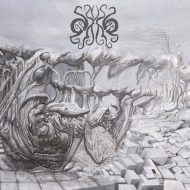 The world of metal certainly doesn’t avoid difficult subjects, or subjects the majority of people shy away from. In fact, you could say metal seeks those subjects out. Yet, the album at hand takes difficult subjects to an entirely new level. Onkos forsakes fantasy monsters, fictional horror, violence and war for something much more frightening – the disease of cancer.
The world of metal certainly doesn’t avoid difficult subjects, or subjects the majority of people shy away from. In fact, you could say metal seeks those subjects out. Yet, the album at hand takes difficult subjects to an entirely new level. Onkos forsakes fantasy monsters, fictional horror, violence and war for something much more frightening – the disease of cancer.
“Onkos” is Old-Greek for mass, load or burden, and the original term for all kinds of tumours, malignant and benign. It is the root of the modern word “oncology”, and it is the name Robert Woods-LaDue (the man behind Onkos) chose for his cancer-themed project.
What kind of music does an LP about cancer feature? Black metal, death metal, doom, or something completely different?
If you’re thinking death metal, then you’re right, partly at least. Woods-LaDue did stick to some of the conventions of the genre, but you’ll be listening for blast beats in vain. And there are no electric guitars either.
Surprised? I was, too. You see, this, as the press info says, is an attempt to make metal, or heavy music, without the usual ingredients. The drums and electric guitars haven been replaced with six chekeré, a Cuban/West African percussion instrument, and a battery of acoustic guitars. In a way, if you consider the album’s subject, it makes sense. The sound is much more organic this way, and more representative of the disease. But is it metal? And why would it have to be?
The album’s lyrics, mostly unintelligible because of the growled vocals, circle around the disease and everything related to it: from diagnosis to medication, to pain and side effects. The experience is often described vividly, without any reserve (“I present the magenta excrement”). Frequently, the lyrics are not coherent and have a stream of consciousness character. Sometimes, they consist only of the word “cancer”, repeated over and over again.
As you might have guessed by now, this is not an easy listen. And it isn’t supposed to be. But does it work as a concept? Yes and no. The combination of chekeré, acoustic guitars, and a cavernous bass is intriguing for one, two or even three tracks, but taken over the course of a whole album, it gets wearisome. This is especially true for the vocals, because there is very little variation in their tonality.
Having cancer and being treated for it is, of course, wearisome as well, so this effect might be intended. But sometimes, the battery of acoustic guitars reminds me of mariachi bands, which I believe is counterproductive to the original intent. That’s why I’d say that partly the concept doesn’t work. Also, I wouldn’t call Onkos metal, or heavy.
In summary: Innovative and interesting, but in small doses, over the course of a whole album too much of an ordeal. However, raises interesting questions: Can metal go beyond its conventions? Can one make metal without the usual ingredients?
(6/10 Slavica)

Leave a Reply